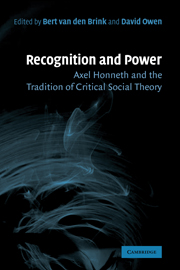Book contents
- Frontmatter
- Contents
- List of Figures and Tables
- Contributors
- Acknowledgments
- 1 Introduction
- PART I PHILOSOPHICAL APPROACHES TO RECOGNITION
- 2 Analyzing Recognition: Identification, Acknowledgement, and Recognitive Attitudes towards Persons
- 3 Recognition and Reconciliation: Actualized Agency in Hegel's Jena Phenomenology
- 4 Damaged Life: Power and Recognition in Adorno's Ethics
- 5 The Potential and the Actual: Mead, Honneth, and the “I”
- PART II RECOGNITION AND POWER IN SOCIAL THEORY
- PART III RECOGNITION AND POWER IN POLITICAL THEORY
- PART IV AXEL HONNETH ON RECOGNITION AND POWER
- Bibliography
- Index
4 - Damaged Life: Power and Recognition in Adorno's Ethics
Published online by Cambridge University Press: 24 July 2009
- Frontmatter
- Contents
- List of Figures and Tables
- Contributors
- Acknowledgments
- 1 Introduction
- PART I PHILOSOPHICAL APPROACHES TO RECOGNITION
- 2 Analyzing Recognition: Identification, Acknowledgement, and Recognitive Attitudes towards Persons
- 3 Recognition and Reconciliation: Actualized Agency in Hegel's Jena Phenomenology
- 4 Damaged Life: Power and Recognition in Adorno's Ethics
- 5 The Potential and the Actual: Mead, Honneth, and the “I”
- PART II RECOGNITION AND POWER IN SOCIAL THEORY
- PART III RECOGNITION AND POWER IN POLITICAL THEORY
- PART IV AXEL HONNETH ON RECOGNITION AND POWER
- Bibliography
- Index
Summary
Theodor W. Adorno's most well-known statement about ethics probably is “Es gibt kein richtiges Leben im falschen”; “There is no way of living a false life correctly.” This is Adorno's answer to the old question in ethics and social philosophy as to whether good, just, well-ordered lives can be led in societies that are neither good nor just nor well-ordered. Adorno has important things to say about the fatal dynamics between the false – damaged, distorted – social and cultural conditions modern individuals live under, on the one hand, and these individuals' (in)ability to recognize themselves and others as moral and ethical agents, on the other. Since Adorno accounts for false life in terms of a theory of rationality according to which the control of inner nature, social relationships, and of the external physical world determines humans' chances at survival, there is not much room in Adorno's modern world for forms of recognition of self and others as beings with a non-instrumental, moral status. Here we find a link between Adorno's account of power understood as rational control (Herrschaft) and his account of recognition. We will see that insofar as Adorno has an account of recognition at all, it is an account of moments of intersubjective responsiveness towards genuine needs of self and other that escape false rationality. But recognition is always momentary, an escape from reification that cannot be stabilized and institutionalized, cannot be turned into a trustworthy disposition for action that would escape the way false life shapes us.
- Type
- Chapter
- Information
- Recognition and PowerAxel Honneth and the Tradition of Critical Social Theory, pp. 79 - 99Publisher: Cambridge University PressPrint publication year: 2007
- 3
- Cited by

